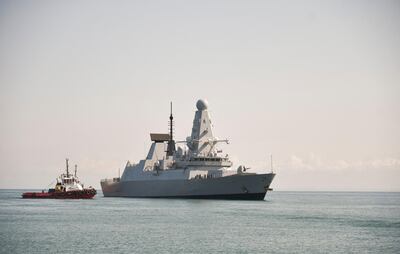Classified British defence documents have been discovered “in a soggy heap” by a member of the public at a bus stop in England.
The Ministry of Defence documents include discussions on a possible British military presence in Afghanistan after the US and Nato withdraws troops later this year.
They also address the passage of Royal Navy warship HMS Defender through Ukrainian waters off the Crimea coast last week and likely Russian reactions.
The sensitive papers were discovered in the south-eastern county of Kent and handed to the BBC, which reported the finding on Sunday.
It said most of the nearly 50 pages of documents were stamped "official sensitive" and included emails and PowerPoint presentations.
At least one page was labelled “secret UK Eyes Only” and addressed to Defence Secretary Ben Wallace, outlining sensitive recommendations for the UK military’s presence in Afghanistan.
It concerned a US request for British assistance in the country and whether any British special forces will remain once the American withdrawal is complete.
The documents issued a warning regarding the deteriorating situation in the country and the risk of further destabilisation and violence.
"Any UK footprint in Afghanistan that persists … is assessed to be vulnerable to targeting by a complex network of actors," the report says, noting that "the option to withdraw completely remains".
The reduced presence of Nato forces "is already impairing the situational awareness that we [and the US] used to enjoy across the country", it says.
The BBC said it would not publish details which would put military personnel at risk in Afghanistan.
The ministry said it was investigating the recovery of the documents, which it said had been reported missing by one of its employees.
“The Ministry of Defence was informed last week of an incident in which sensitive defence papers were recovered by a member of the public,” it said.
“The department takes the security of information extremely seriously and an investigation has been launched.”
The person who found the documents gave them to the BBC once they realised their sensitive nature, but asked to remain anonymous.

Black Sea preparations
The papers on HMS Defender showed officials preparing for Russia's reaction when the warship sailed close to Crimea in the Black Sea.
Russia considers the waters off Crimea as its own, but its annexation of the peninsula in 2014 was not recognised by most of the international community which regards it as Ukraine’s territory.
HMS Defender sailed through the waters on Wednesday, leading to a diplomatic spat after Russia claimed it had fired warning shots and dropped bombs in the path of the warship to force it away.
Britain rejected Moscow’s account of the incident and said any warning shots were part of a routine gunnery exercise by the Russians.
It said it did not recognise the claim of bombs being dropped.
The lost documents showed defence officials speculating that interaction with the Russian military would become “more frequent and assertive”.
They showed that Britain took a calculated risk by deploying the warship in order to demonstrate support for the government of Ukraine, the BBC said.
The UK ministry said the ship “conducted innocent passage through Ukrainian territorial waters in accordance with international law”.
“As the public would expect, the Ministry of Defence plans carefully,” it said, referring to the documents.
Relations between Russia and the West are at their lowest point since the end of the Cold War after clashes on Crimea and other issues.
Russia warned Britain and the US on Friday against “tempting fate” by deploying military vessels to the area.
“We call on the Pentagon and the British Navy, which are sending their warships into the Black Sea, not to tempt fate in vain,” said Maj Gen Igor Konashenkov, chief spokesman for Russia's Ministry of Defence.

